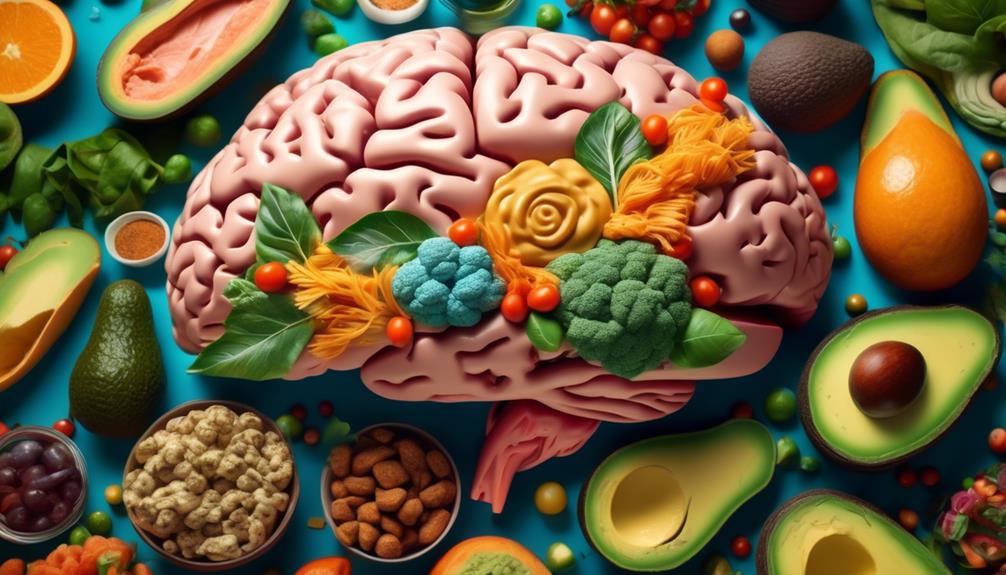Are you curious about the impact of the ketogenic diet on inflammation? Look no further. In this comprehensive guide, we will explore the intricate relationship between keto and inflammation, shedding light on the potential benefits and drawbacks of this popular dietary approach.
As you delve into the pages ahead, you will uncover the science behind the ketogenic diet, its potential anti-inflammatory effects, and even its impact on joint health.
But that's not all— we will also discuss how to strike a balance between keto and anti-inflammatory foods for optimal inflammation control.
So, fasten your seatbelt and get ready to unravel the mysteries of keto's impact on inflammation.
What Is the Ketogenic Diet?

The ketogenic diet is a low-carbohydrate, high-fat eating plan that has gained popularity for its potential benefits in weight loss and improving metabolic health. Understanding ketosis is essential to comprehending the benefits of the ketogenic diet. Ketosis occurs when the body switches from using glucose as its primary fuel source to using ketones, which are produced from fat breakdown.
By drastically reducing carbohydrate intake and increasing fat consumption, the ketogenic diet forces the body into a state of ketosis. This metabolic state has several potential benefits.
Firstly, the ketogenic diet has been shown to aid in weight loss. When the body is in ketosis, it becomes more efficient at burning fat for fuel, which can lead to a reduction in body weight. Additionally, the diet helps to control hunger and stabilize blood sugar levels, making it easier to adhere to a calorie deficit.
Secondly, the ketogenic diet may have positive effects on metabolic health. Research suggests that it can improve insulin sensitivity, reduce inflammation, and lower triglyceride levels. These factors are crucial for maintaining overall metabolic health and reducing the risk of chronic diseases such as type 2 diabetes and heart disease.
Understanding Inflammation and Its Role in Health
Understanding inflammation and its role in health is crucial for maintaining overall well-being and preventing chronic diseases. Inflammation is a natural process that occurs in response to injury or infection, serving as a protective mechanism for the body. However, chronic inflammation can contribute to the development of various health conditions, such as heart disease, diabetes, and autoimmune disorders.
Inflammation control is essential for maintaining optimal health. A key factor in controlling inflammation lies in our diet. Certain foods have been shown to promote inflammation, while others have anti-inflammatory properties. For instance, a diet high in processed foods, refined sugars, and unhealthy fats can increase inflammation levels. On the other hand, a diet rich in fruits, vegetables, whole grains, lean proteins, and healthy fats, such as those found in fish and nuts, can help reduce inflammation.
Several studies have suggested that the ketogenic diet, which is low in carbohydrates and high in fats, may have anti-inflammatory effects. By minimizing carbohydrate intake, the body enters a state of ketosis, where it primarily burns fat for fuel. This metabolic shift may lead to a decrease in inflammation markers in the body.
While more research is needed to fully understand the relationship between the ketogenic diet and inflammation, incorporating anti-inflammatory foods into your diet is a practical approach to reduce inflammation and promote overall health.
The Link Between Diet and Inflammation

To further explore the impact of diet on inflammation, it's important to consider the connection between what we eat and the inflammatory response in our bodies. Research has shown that certain dietary factors can either promote or reduce inflammation in the body. Here are some key points to consider:
• Pro-inflammatory foods:
- Processed foods: These are often high in refined sugars, unhealthy fats, and additives, which can trigger inflammation.
- Trans fats: Found in fried and processed foods, trans fats are known to promote inflammation in the body.
• Anti-inflammatory foods:
- Fruits and vegetables: These are rich in antioxidants, vitamins, and minerals that can help reduce inflammation.
- Healthy fats: Omega-3 fatty acids, found in fatty fish, walnuts, and flaxseeds, have been shown to have anti-inflammatory properties.
It is also important to note that individual responses to specific foods may vary. While some people may find relief from inflammation by avoiding certain foods, others may not see the same impact. This highlights the importance of personalized dietary approaches when addressing inflammation.
How Does the Keto Diet Work?
To understand how the keto diet works, it's important to grasp the mechanism of ketosis. When you consume a high-fat, low-carb diet, your body enters a state of ketosis, where it starts using fat as its primary fuel source instead of carbohydrates.
This metabolic shift not only promotes weight loss but also has an impact on inflammation in the body.
Mechanism of Ketosis
By entering a state of ketosis, the body undergoes a metabolic shift that allows it to primarily utilize fat as its main source of fuel instead of carbohydrates. This metabolic switch occurs when carbohydrate intake is significantly reduced, leading to a decrease in blood glucose levels and an increase in the production of ketone bodies in the liver.
The mechanism of ketosis involves several key steps:
- Restriction of Carbohydrates: By limiting carbohydrate intake to a very low level, typically below 50 grams per day, the body is forced to find alternative sources of energy. This restriction triggers a decrease in insulin production and an increase in glucagon, signaling the body to break down stored fat.
- Fat Breakdown and Ketone Production: With limited glucose available, the body starts breaking down fatty acids stored in adipose tissue and converts them into ketone bodies. Ketone bodies, such as acetoacetate and beta-hydroxybutyrate, are then released into the bloodstream and serve as an alternative fuel source for the brain and muscles.
Through this intricate process, the body adapts to utilizing fat as its primary energy source, leading to numerous physiological changes associated with the ketogenic diet.
Impact on Inflammation
The ketogenic diet has been shown to have a significant impact on inflammation, as it promotes a metabolic state that reduces the production of inflammatory markers in the body.
Inflammation is a normal response of the immune system to protect the body against infection or injury. However, chronic inflammation can contribute to the development of various diseases, including cardiovascular disease, diabetes, and certain cancers.
Studies have found that the ketogenic diet can reduce inflammation markers such as C-reactive protein (CRP) and interleukin-6 (IL-6), which are associated with increased inflammatory response. This reduction in inflammation may be attributed to the ketones produced during ketosis, as they've been shown to have anti-inflammatory properties.
Additionally, the ketogenic diet promotes weight loss, which can further reduce inflammation and improve overall health.
Potential Anti-Inflammatory Effects of Keto

Research suggests that a ketogenic diet may have potential anti-inflammatory effects. The mechanisms of action by which the ketogenic diet exerts these effects are still being studied, but several hypotheses have been proposed.
Here are two main ways in which the ketogenic diet may help reduce inflammation:
- Ketones and Metabolic Pathways:
- When you follow a ketogenic diet, your body produces ketone bodies as an alternative source of fuel. These ketones, such as beta-hydroxybutyrate (BHB), have been shown to modulate various inflammatory pathways in the body.
- The ketogenic diet has been found to inhibit the production of pro-inflammatory molecules, such as cytokines and chemokines, while promoting the production of anti-inflammatory molecules, such as adiponectin. These effects can help dampen the inflammatory response.
- Gut Microbiome:
- Emerging research suggests that the ketogenic diet may influence the composition and diversity of the gut microbiome, which plays a crucial role in regulating immune responses and inflammation.
- By promoting the growth of beneficial bacteria and reducing the numbers of potentially harmful bacteria in the gut, the ketogenic diet may help maintain a healthy gut microbiome and reduce inflammation.
These potential anti-inflammatory effects of the ketogenic diet have led to investigations into its clinical applications for various inflammatory conditions, including neurodegenerative diseases, metabolic disorders, and autoimmune disorders. However, more research is needed to fully understand the extent of these effects and their long-term implications.
Research on Keto's Impact on Inflammation
Research on Keto's impact on inflammation has yielded promising results.
Numerous studies have shown that following a ketogenic diet can lead to a reduction in inflammation markers in the body.
This reduction in inflammation is thought to be due to the mechanisms behind the ketogenic diet, such as the decrease in carbohydrate intake and the increase in ketone production.
Inflammation Reduction Through Keto
By adopting a ketogenic diet, you can potentially reduce inflammation in your body. Research has shown that the keto diet may have a positive effect on inflammation markers, leading to decreased inflammation throughout the body.
Here are two key ways in which keto's effect on inflammation reduction can be explained:
- Ketones as an energy source: When you follow a ketogenic diet, your body enters a state of ketosis, where it relies on ketones for fuel instead of glucose. This shift in energy metabolism can lead to a decrease in inflammation. Ketones have been shown to inhibit the production of inflammatory molecules, reducing inflammation in various tissues.
- Reduction in insulin levels: The keto diet is also known for its ability to lower insulin levels. Insulin plays a role in promoting inflammation in the body. By reducing insulin levels, the keto diet may help to decrease inflammation and its associated health risks.
Mechanisms Behind Keto's Anti-Inflammation
When following a ketogenic diet, the mechanisms behind its anti-inflammatory effects become apparent. Research has shown that the metabolic changes induced by the ketogenic diet play a crucial role in reducing inflammation.
One mechanism is the reduction of insulin levels. By restricting carbohydrate intake, the body enters a state of ketosis, where it uses fat for fuel instead of glucose. This leads to lower insulin levels, which can help decrease inflammation.
Additionally, the production of ketones during ketosis has been found to have anti-inflammatory properties. Ketones can inhibit the activation of inflammatory pathways and reduce the production of pro-inflammatory molecules.
Furthermore, the ketogenic diet promotes the production of endogenous antioxidants, which can counteract oxidative stress and inflammation.
These mechanisms collectively contribute to the anti-inflammatory effects of the ketogenic diet.
Keto and Autoimmune Diseases

The ketogenic diet has shown promise in managing symptoms of autoimmune diseases. When it comes to keto and autoimmune diseases, the diet's ability to control inflammation is key.
Here are two important points to consider:
- Reduced inflammation: Autoimmune diseases occur when the immune system mistakenly attacks healthy cells and tissues. Inflammation plays a significant role in the development and progression of these diseases. The ketogenic diet, with its low carbohydrate intake, can help reduce inflammation in the body. By limiting the consumption of sugar and processed foods, which are known to trigger inflammation, the keto diet may help alleviate symptoms associated with autoimmune diseases.
- Improved immune function: The immune system plays a vital role in autoimmune diseases. Research suggests that the ketogenic diet may enhance immune function, leading to better management of autoimmune conditions. By providing the body with a steady supply of ketones and promoting metabolic flexibility, the keto diet may support immune cell function and balance, potentially reducing the severity of autoimmune symptoms.
While the ketogenic diet shows promise in managing symptoms of autoimmune diseases, it's essential to consult with a healthcare professional before making any dietary changes. They can provide personalized advice and guidance based on individual needs and medical history.
Keto and Cardiovascular Health
When it comes to cardiovascular health, the impact of a keto diet is a topic of interest.
One point to consider is the potential effect on heart disease risk. Research suggests that the keto diet may help reduce certain risk factors associated with heart disease, such as weight loss and improved blood sugar control.
Additionally, there's evidence that the diet can positively influence cholesterol levels by increasing HDL (good) cholesterol and decreasing LDL (bad) cholesterol.
Heart Disease Risk
Reducing heart disease risk is a key consideration when examining the impact of the ketogenic diet on cardiovascular health. The ketogenic diet has shown potential benefits for heart disease prevention, but its impact on blood pressure remains a topic of debate. Here are some important points to consider:
- Blood pressure: Some studies suggest that the ketogenic diet may help lower blood pressure, a major risk factor for heart disease. By reducing carbohydrate intake and promoting weight loss, the diet may lead to improved blood pressure control.
- Cholesterol levels: While the ketogenic diet may increase levels of LDL cholesterol (the 'bad' cholesterol), it also tends to raise HDL cholesterol (the 'good' cholesterol). The overall effect on heart disease risk is still uncertain and may vary depending on individual factors.
It is important to note that more research is needed to fully understand the long-term impact of the ketogenic diet on heart disease risk. As always, consulting with a healthcare professional is recommended before making any significant dietary changes.
Cholesterol Levels
To understand the impact of the ketogenic diet on cardiovascular health, it's essential to examine its effect on cholesterol levels. Cholesterol management plays a crucial role in maintaining a healthy heart.
The ketogenic diet, which is low in carbohydrates and high in fat, has been shown to have both positive and negative effects on lipid profiles.
Several studies have demonstrated that the ketogenic diet can lead to a reduction in total cholesterol levels. This is attributed to the increased consumption of healthy fats and the decrease in refined carbohydrates. Moreover, the diet has been found to increase levels of high-density lipoprotein (HDL) cholesterol, which is often referred to as the 'good' cholesterol.
However, there's evidence to suggest that the ketogenic diet may also increase levels of low-density lipoprotein (LDL) cholesterol, which is considered the 'bad' cholesterol. This increase in LDL cholesterol is primarily seen in individuals who are genetically susceptible to it.
Keto and Brain Health

The ketogenic diet has been studied for its potential impact on brain health. Research suggests that following a keto diet may have positive effects on cognitive function and could potentially be beneficial for individuals with neurodegenerative diseases. Here are some key points to consider:
- Keto and Cognitive Function:
Studies have shown that the ketogenic diet may improve cognitive function, including memory and attention span. This could be attributed to the diet's ability to enhance mitochondrial function and promote the production of ketones as an alternative energy source for the brain. The reduction in blood sugar levels and insulin resistance associated with a keto diet may also contribute to improved brain function, as high blood sugar levels have been linked to cognitive decline.
- Ketogenic Diet and Neurodegenerative Diseases:
Emerging evidence suggests that the ketogenic diet may have potential therapeutic benefits for neurodegenerative diseases such as Alzheimer's and Parkinson's disease. The diet's ability to reduce inflammation, oxidative stress, and improve mitochondrial function could play a role in slowing down disease progression. Some studies have shown that a keto diet may enhance the production of ketones, which can provide an alternative fuel source for brain cells affected by these diseases.
While more research is needed to fully understand the effects of the ketogenic diet on brain health, the existing evidence suggests that it may have promising potential in improving cognitive function and possibly even in managing neurodegenerative diseases.
Keto and Gut Health
When following a keto diet, it's important to consider its impact on gut health. The balance of the gut microbiome plays a crucial role in overall health and can influence inflammation levels in the body.
Research suggests that the keto diet may have both positive and negative effects on gut health, and understanding these dynamics can help optimize the diet's benefits while minimizing potential risks.
Gut Microbiome Balance
Maintaining a balanced gut microbiome is crucial for optimal gut health while following a ketogenic diet. The gut microbiome refers to the trillions of microorganisms that reside in our digestive tract, playing a vital role in digestion, nutrient absorption, and immune function.
When it comes to gut health and the ketogenic diet, two key factors come into play: gut microbiome diversity and the gut-brain axis connection.
- Gut microbiome diversity:
A diverse gut microbiome is associated with better overall health.
The ketogenic diet, which is low in carbohydrates and high in fats, may have an impact on the diversity of the gut microbiome.
- Gut-brain axis connection:
The gut and the brain are connected via a bidirectional communication pathway known as the gut-brain axis.
The gut microbiome plays a crucial role in regulating this communication, influencing mood, cognition, and behavior.
Understanding and maintaining a balanced gut microbiome while following a ketogenic diet is essential for promoting optimal gut health and overall well-being.
Impact on Inflammation
Following a ketogenic diet can have a significant impact on inflammation and gut health. Research suggests that the keto diet may help improve skin health by reducing inflammation. Inflammation plays a role in various skin conditions such as acne, eczema, and psoriasis. By reducing carbohydrate intake and promoting the consumption of healthy fats and proteins, the keto diet may help reduce skin inflammation and improve overall skin health.
Additionally, studies have shown that the keto diet may have potential anti-cancer effects. Cancer is often associated with chronic inflammation, and the ketogenic diet's ability to reduce inflammation may help lower the risk of certain cancers. However, more research is needed to fully understand the relationship between the keto diet and cancer risk.
While the keto diet shows promise in improving inflammation and potentially reducing cancer risk, it's important to consult with a healthcare professional before making any dietary changes, especially for individuals with pre-existing medical conditions.
Keto and Joint Health

The ketogenic diet may have a positive impact on joint health. Research suggests that the keto diet's anti-inflammatory effects may help alleviate symptoms of arthritis and joint pain. Here are some key points to consider:
- Reduced inflammation: The keto diet is known for its ability to reduce inflammation in the body. Inflammation is a major contributor to joint pain and arthritis. By following a low-carb, high-fat diet, you may experience a decrease in joint inflammation, leading to improved joint health.
- Weight loss: Obesity is a risk factor for arthritis and joint pain. The keto diet has been shown to be effective for weight loss, which can alleviate stress on the joints and reduce pain. By shedding excess pounds, you may experience less strain on your joints, resulting in improved joint function.
Potential Drawbacks of the Keto Diet
While the keto diet has been praised for its potential health benefits, it's important to consider some of the potential drawbacks associated with this dietary approach. One potential drawback of the keto diet is its impact on weight loss. While many people experience significant weight loss on the keto diet, it's important to note that this weight loss may not be sustainable in the long term. Some studies have shown that weight loss achieved through the keto diet is often regained once individuals return to a more balanced eating pattern.
Additionally, there are several potential side effects of the ketogenic diet that should be taken into consideration. These side effects can include constipation, bad breath, nutrient deficiencies, and an increased risk of developing kidney stones. The restrictive nature of the diet, which severely limits carbohydrate intake, can also make it difficult for individuals to meet their nutritional needs.
It is worth noting that the keto diet may not be suitable for everyone. Individuals with certain medical conditions, such as liver disease or pancreatitis, should avoid this diet due to potential complications. Additionally, pregnant or breastfeeding women should consult with their healthcare provider before embarking on a ketogenic diet.
Balancing Keto With Anti-Inflammatory Foods

To balance the keto diet with anti-inflammatory foods, it's important to incorporate a variety of nutrient-rich options into your meals. By doing so, you can manage inflammation through your diet and promote overall health and well-being.
Here are some strategies and anti-inflammatory recipes to help you on your journey:
- Include plenty of fruits and vegetables: These are rich in antioxidants, vitamins, and minerals that can help reduce inflammation. Opt for colorful options like berries, leafy greens, and cruciferous vegetables.
- Focus on healthy fats: While the keto diet is high in fats, it's important to choose the right kinds. Incorporate foods like avocados, olive oil, and fatty fish, which are rich in omega-3 fatty acids known for their anti-inflammatory properties.
- Incorporate herbs and spices: Many herbs and spices possess anti-inflammatory properties. Turmeric, ginger, garlic, and cinnamon are excellent choices to add flavor and reduce inflammation.
- Don't forget about protein: Include lean sources of protein like poultry, fish, and legumes. These provide essential amino acids and can help repair tissues and reduce inflammation.
- Stay hydrated: Water is essential for overall health and can aid in reducing inflammation. Aim for at least 8 cups of water per day.
Conclusion: Navigating Keto for Inflammation Control
Navigating the keto diet for inflammation control requires careful consideration of nutrient-rich foods and a mindful approach to balancing macronutrients. While the keto diet has shown promising results in terms of weight loss and short-term inflammation reduction, its long-term effects on inflammation are still being studied.
Research suggests that the keto diet may have anti-inflammatory effects due to its ability to reduce insulin levels and promote ketosis. By limiting carbohydrate intake and increasing fat consumption, the body enters a state of ketosis where it relies on fat for fuel instead of glucose. This metabolic shift has been associated with decreased levels of inflammation markers in the body.
However, it's important to note that the long-term effects of the keto diet on inflammation aren't well understood. Some studies have found that prolonged adherence to the keto diet may lead to an increase in markers of inflammation, such as C-reactive protein. This could potentially negate the initial anti-inflammatory benefits observed in the short term.
To effectively navigate the keto diet for inflammation control, it's crucial to prioritize nutrient-rich foods such as leafy greens, fatty fish, avocados, and nuts. These foods provide essential vitamins, minerals, and antioxidants that support overall health and may help mitigate any potential inflammation caused by long-term adherence to the keto diet.
Conclusion
In conclusion, the ketogenic diet has shown potential anti-inflammatory effects, making it a possible option for inflammation control.
For example, a case study conducted on individuals with rheumatoid arthritis found that following a ketogenic diet resulted in reduced inflammation markers and improved joint pain.
While there are potential drawbacks to consider, balancing the keto diet with anti-inflammatory foods can help optimize its benefits.
It's important to consult with a healthcare professional before making any dietary changes for inflammation management.







